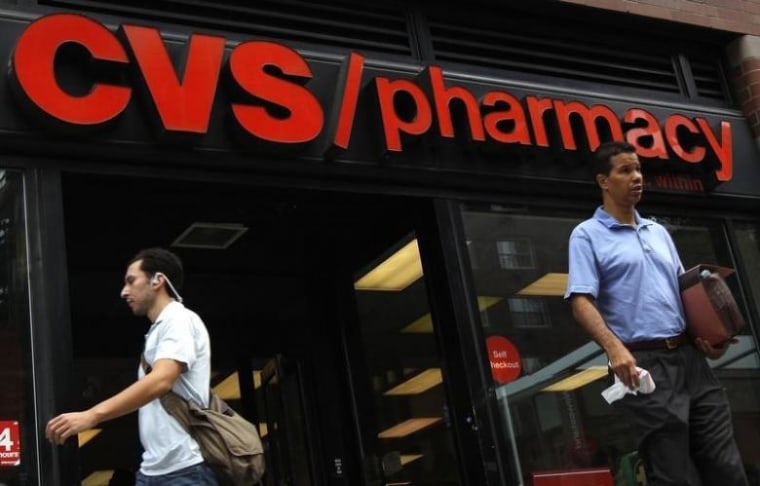Your friendly neighborhood CVS is afraid of Amazon. To protect itself, it wants to get a whole lot bigger. That's not necessarily better for you.
The nation's largest pharmacy chain is in talks to buy the country's oldest insurer, Aetna, sources tells Reuters and the Wall Street Journal, for over $66 billion.
Signs that Amazon is elbowing its way into the pharmacy business helped push CVS to pursue Aetna, a person familiar with the matter told the Journal. The latest indication came on Thursday, when it was revealed that Amazon has been granted a pharmacy licence in 12 states.
CVS would be fighting a war on two fronts if Amazon were to enter the $560 billion prescription market: Much of what CVS sells in its own brick and mortar stores, from toilet paper to light bulbs to nail polish, can also be found on Amazon.
Aetna and CVS spokespersons declined NBC News' request for comment, saying they don't comment on rumors.
The integration move would give CVS more power over prices as pharmacy retailers fend off not just the threat of Amazon, but the demand by regulators and consumers for lower prices and greater transparency.
Absorbing Aetna's 46.7 million members would mean CVS could guarantee itself a huge chunk of customers for its prescription services, and drive more traffic to its drugstores. Armed with a larger customer base, it could negotiate lower costs with drug makers. And controlling a health insurer could let it strike new deals that bind prices to how well patients fare.
“It’s a sign of the times," Michael Rea, the founder and CEO of Rx Savings Solutions, told NBC News in an email. "CVS owning Aetna could mean they may immediately compete with the health plans they currently service for PBM functions. This differentiates CVS revenue and associated exposure to threats such as growing scrutiny on drug costs.”
Proponents of consolidation say they increase efficiency and that "economies of scale" allow for fixed costs to be reduced, processes to be standardized, supply chains combined and operations streamlined.
But consumer advocates say the promised savings in healthcare mergers are "illusory" and rarely passed on to consumers if they come to be.
"CVS already has all the market power it needs," said Robert Weissman, the president of DC-based consumer advocacy group Public Citizen. "Linking up with Aetna does nothing to affect its pharmaceutical price negotiation advantage. Aetna doesn't need expanded market power to engage in negotiations with providers."
"We’ve now seen for decades that consolidation in the healthcare industries costs consumers," he added. "The largest companies find more ways to extract payments from consumers."
While studies have shown the reduced competition usually increases the surviving firm's market power, it doesn't result in lower prices for consumers. In fact, prices usually get get higher.
When hospitals went on a physician office buying spree in California, prices rose 10 to 20 percent overall, according to a UC Berkeley study published in the Journal of the American Medical Association.
Experts say despite the deal also raises antitrust flags.
"The antitrust issues, given current legal standards, are not easy. They would require some careful efforts to delineate the kinds of competitive risks that this sort of a combination would create," Peter Carstensen, a former antitrust lawyer for the Department of Justice, told NBC News in an email.
But consumer advocates are doubtful that the Trump administration would strongly enforce antitrust regulations and hold up the merger.
President Donald J. Trump has vowed to roll back regulations and create a more pro-business-Washington. Both of his nominations for the top two antitrust officials that would be involved, FTC Chair nominee Joseph Simon and Makan Delrahim, as head of Justice Department’s Antitrust Division, have in private practice defended companies in merger reviews and fought antitrust claims. Delrahim did work for health insurer Anthem on its bid to acquire rival Cigna
"The deck is stacked," said Weissman.

